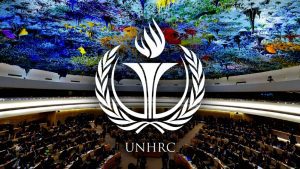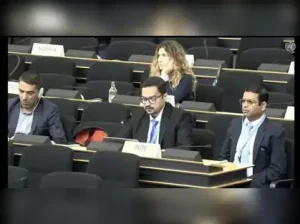International– A significant diplomatic confrontation unfolded at the United Nations Human Rights Council (UNHRC) in Geneva on September 10, 2025, when India delivered a sharp rebuke to Switzerland over comments regarding minority protection. The exchange has drawn international attention, highlighting the complex dynamics between two nations traditionally considered close partners in multilateral forums.
 Also Read: India-Switzerland UNHRC minorities
Also Read: India-Switzerland UNHRC minorities
Other: 60th session of the Human Rights Council (8 September – 8 October 2025)
The diplomatic tension erupted during the 60th Session of the Human Rights Council when Indian diplomat Kshitij Tyagi dismissed Swiss remarks as “surprising, shallow, and ill-informed.” This unprecedented response came after Switzerland, exercising its role as the current president of the council, raised concerns about India’s treatment of minorities and media freedom.
 Kshitij Tyagi, serving as Counsellor in India’s Permanent Mission in Geneva, delivered the country’s response during the General Debate on the oral update by the High Commissioner. The India-Switzerland UNHRC minorities controversy represents a rare public disagreement between the two nations, which have historically maintained cordial diplomatic relations across various international platforms.
Kshitij Tyagi, serving as Counsellor in India’s Permanent Mission in Geneva, delivered the country’s response during the General Debate on the oral update by the High Commissioner. The India-Switzerland UNHRC minorities controversy represents a rare public disagreement between the two nations, which have historically maintained cordial diplomatic relations across various international platforms.
The Swiss delegation had specifically called upon the Indian government to “take effective measures to protect minorities and uphold the rights to the freedom of expression and the freedom of the media.” This statement formed the basis of India’s strong counterresponse, marking a significant moment in contemporary diplomatic discourse.
In an unexpected diplomatic manoeuvre, India turned the spotlight on Switzerland’s own human rights record. Tyagi emphasised that Switzerland should address its domestic challenges, specifically mentioning “racism, systematic discrimination and xenophobia” within the Alpine nation. This strategic response effectively shifted the narrative from defensive to offensive diplomacy.
The Indian diplomat’s statement highlighted Switzerland’s position as president of the UN Human Rights Council, arguing that this role made it “all the more important for Switzerland to avoid wasting the Council’s time with narratives that are blatantly false and do not do justice to the reality of India.”
India’s response included an offer to help Switzerland tackle racism, systematic discrimination, and xenophobia in the Alpine nation. This diplomatic offer, while maintaining diplomatic courtesy, served as a pointed reminder that human rights challenges exist across nations, regardless of their international standing.
The India-Switzerland UNHRC minorities dispute gains additional significance considering Switzerland’s current presidency of the Human Rights Council. This position typically requires maintaining neutrality and facilitating constructive dialogue among member nations. India’s criticism suggests that Switzerland may have overstepped its presidential role by making country-specific allegations.
Switzerland’s presidency of the council comes with responsibilities to ensure fair and balanced treatment of all member states. India’s response indicates dissatisfaction with what it perceives as biased treatment, particularly from a nation holding such an influential position within the international human rights framework.
The diplomatic exchange raises questions about the balance between Switzerland’s presidential duties and its sovereign right to express concerns about other nations’ human rights records. This tension reflects broader challenges within multilateral institutions where nations must navigate between leadership roles and national interests.
Central to India’s response was its assertion of democratic legitimacy and pluralistic traditions. Tyagi described India as “the world’s largest, most diverse, and vibrant democracy with a civilisational embrace of pluralism.” This characterisation serves multiple diplomatic purposes, reinforcing India’s international image while challenging Switzerland’s assessment.
The emphasis on India’s democratic credentials reflects the country’s strategy of leveraging its electoral legitimacy in international forums. With over 900 million eligible voters in its most recent general election, India frequently cites its democratic scale and diversity as evidence of its commitment to inclusive governance.
The India-Switzerland UNHRC minorities debate also touches on India’s historical narrative of pluralism, drawing from centuries of cultural, religious, and linguistic diversity. This civilizational argument positions India’s approach to minority rights within a broader historical context, contrasting with what it perceives as contemporary European perspectives on multiculturalism.
The public nature of this diplomatic disagreement signals potential shifts in India’s approach to international criticism. Traditionally, India has responded to human rights concerns through established diplomatic channels, making this public rebuttal particularly noteworthy for its directness and timing.


Switzerland’s role as a neutral facilitator in international relations faces scrutiny following India’s response. The Alpine nation has historically positioned itself as a mediator and honest broker in global disputes, making India’s criticism particularly sensitive from a reputational perspective.
The specific issues raised by Switzerland regarding media freedom and minority protection reflect ongoing international concerns about democratic space in various countries. These topics have become standard elements in human rights discourse, making Switzerland’s comments part of broader global conversations about democratic governance.
India’s response to these concerns indicates its sensitivity to international scrutiny of domestic policies. The country has consistently maintained that its democratic institutions and constitutional framework provide adequate protection for minority rights and press freedom.
The India-Switzerland UNHRC minorities exchange highlights the complex relationship between international oversight and national sovereignty in human rights matters. This tension remains a defining characteristic of contemporary multilateral diplomacy, where nations balance international cooperation with domestic policy autonomy.
Despite the sharp exchange, both countries are likely to maintain their broader partnership across various international issues. The diplomatic disagreement, while significant, represents a specific moment of tension rather than a fundamental breakdown in bilateral relations.
The India-Switzerland UNHRC minorities controversy may influence future interactions between the two countries within UN forums. Both nations will likely seek to manage this disagreement while preserving their collaboration on other international issues.
Switzerland’s presidency of the Human Rights Council continues until the end of 2025, potentially creating additional opportunities for diplomatic engagement or further tensions. The management of this relationship will test both countries’ diplomatic skills in separating specific disagreements from broader partnership objectives.
The India-Switzerland UNHRC minorities diplomatic exchange represents a significant moment in contemporary international relations, highlighting the evolving dynamics between traditional partners in multilateral forums. India’s assertive response demonstrates its willingness to challenge international criticism directly, while Switzerland’s position reflects ongoing global concerns about human rights standards.
This diplomatic confrontation underscores the complex challenges facing international human rights institutions, where member nations must balance oversight responsibilities with respect for sovereignty. The resolution of these tensions will influence future interactions within the UN Human Rights Council and broader diplomatic relations between India and European nations.
The long-term implications of this exchange extend beyond bilateral relations, potentially affecting India’s engagement with international human rights mechanisms and Switzerland’s approach to its leadership roles in multilateral institutions. Both countries face the challenge of managing this disagreement while maintaining their broader international partnerships and commitments.

